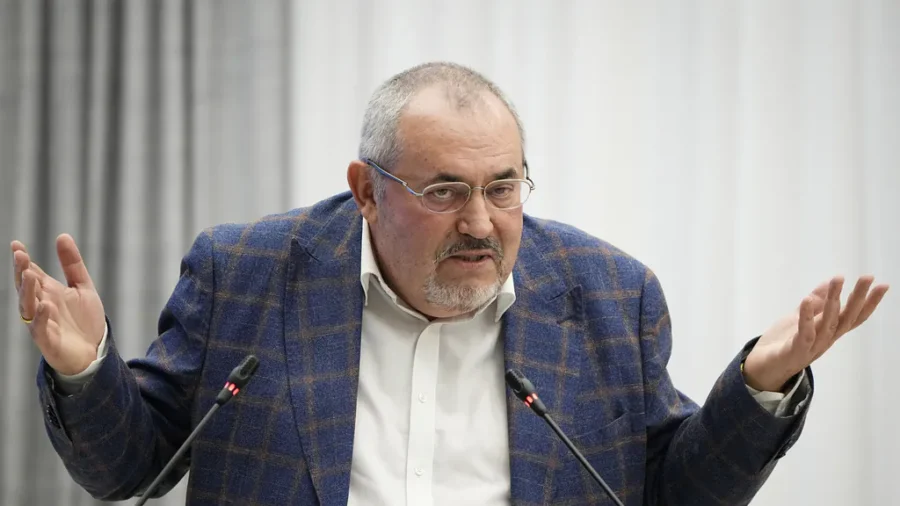Anti-war politician Boris Nadezhdin was rejected Thursday as a candidate in next month’s presidential election, a strong signal from the Kremlin that it would not tolerate public opposition to the invasion of Ukraine.
The move by the Central Election Commission (CEC) smoothens the path for President Vladimir Putin to win a fifth term in power. He faces only token opposition from pro-Kremlin candidates in the March 15-17 vote and is all but certain to win, given his tight control of Russia’s political system.
Mr. Nadezhdin, being a candidate of a political party not represented in the Russian parliament, was required to present at least 100,000 signatures in support of his candidacy to the CEC.
However, the CEC had informed Mr. Nadezhdin that it had ruled 9,000 of the presented invalid, saying that many signatures were of deceased people. As a result, Mr. Nadezhdin was disqualified from entering the presidential race.
Mr. Nadezhdin, a 60-year-old municipal councilor known for his criticism of the Russian president, has openly called for a halt to the war in Ukraine and for starting a dialogue with the West, drawing the attention of opposition parties.
Last month, thousands of Russians lined up across the country in the winter cold to pen down their names to support his candidacy in an unusual show of opposition sympathy in the country’s rigidly controlled political landscape.
Mr. Nadezhdin has asked the CEC to postpone their decision, but his request was declined. He said he would appeal his disqualification in court.
“It’s not me standing here,” Mr. Nadezhdin said. “Hundreds of thousands of Russian citizens who put their signatures down for me are behind me.”
According to a survey by his team, Mr. Nadezhdin currently has 10 percent of voter support, which would put him in second place after current president Putin, several analysts believe it would go up if he got more attention in the spotlight.
“It is clear that if Mr. Nadezhdin is allowed into the presidential race, his ratings will increase,” Journalist Andrei Pertsev of the Carnegie Endowment for International Peace told Al Jazeera.
“This does not contribute to the unconditional victory of Putin. It seems that denying him registration now, would be more beneficial for Putin’s campaign.”
With most of the opposition figures who pose a real challenge either imprisoned or exiled, and the vast majority of independent Russian media outlets banned, Mr. Putin is almost certain to win re-election, thus extending his 24-year leadership of Russia for at least another six years.
In this election, Mr. Putin is running as an independent candidate, requiring his campaign to gather at least 300,000 signatures in support. He was swiftly allowed on the ballot earlier this year, with election officials disqualifying only 91 of the 315,000 signatures that his campaign submitted.
Three other candidates registered to run were nominated by parties represented in parliament. They were, therefore, not required to collect signatures: Nikolai Kharitonov of the Communist Party, Leonid Slutsky of the nationalist Liberal Democratic Party, and Vladislav Davankov of the New People Party.
These candidates have largely supported the Kremlin’s policies and constitute no real opposition. Mr. Kharitonov ran against Mr. Putin in 2004, finishing a distant second.
Meanwhile, Mr. Nadezhdin, running on the ticket of the small center-right Civic Initiative party, urged his supporters not to give up despite the setback.
“One thing happened which many could not believe: citizens sensed the possibility of changes in Russia,” he wrote in an online statement. “It was you who stood in long lines to declare to the whole world: ‘Russia will be a great and a free country.’ And I represented each of you today in the auditorium of the Central Election Commission.”
Mr. Nadezhdin is the second anti-war hopeful to be denied a place on the ballot. In December, Yekaterina Duntsova’s candidacy was rejected by election officials over issues like spelling errors in her paperwork.
Ms. Duntsova, a journalist and a former legislator from the Tver region north of Moscow, had announced plans last year to challenge Mr. Putin. Promoting a vision of Russia as “peaceful, friendly, and ready to cooperate with everyone on the principle of respect,” she said she would bring Moscow and Kyiv to the negotiation table and end the war in Ukraine.
The Associated Press contributed to this report.


